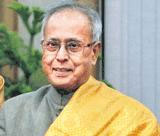
New Delhi, June 16: Signs of wider support to Pranab Mukherjee in the Presidential race were visible today with JD(U) leader Shivanand Tiwari making a strong pitch for a "graceful send off to the respected leader."
Tiwari said it was his personal opinion that "a senior and respected leader like Pranab Mukherjee, who is going into retire (from active politics) should be given a graceful send off".
He said it was clear that Mukherjee will win the Presidential race with Mulayam and Mayawati backing his candidature as UPA candidate.
He, however, said that a decision needed to be taken at the meeting of the NDA where "we will put forward our view points". JD(U) is the second largest partner in the NDA and the party and BJP are sharing power in Bihar.
Finance Minister Mukherjee was yesterday chosen by the ruling UPA as its candidate for the President's post, ending months of speculation.
Yesterday, JD(U) had virtually put its foot down on the issue of NDA taking any stand on Abdul Kalam, projected as Presidential candidate by TMC, following which the opposition alliance deferred its decisio




Comments
Add new comment